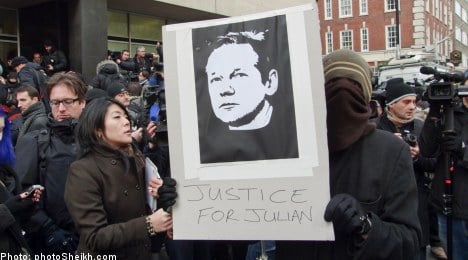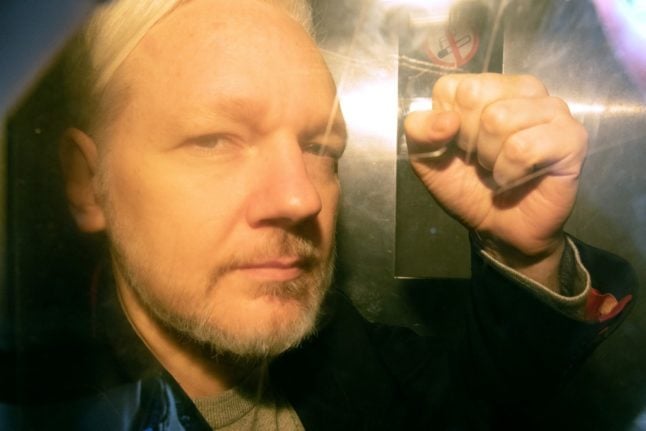At the same time, legal scholars in Sweden rejected claims that a Swedish prosecutor’s investigation was politically motivated.
Speaking with the Daily Mail newspaper on Sunday, Swedish defence attorney Björn Hurtig said he had access to information, currently being kept secret by Swedish prosecutors investigating the case, which would expose the case as “a charade”.
“It was, I believe, more about jealousy and disappointment on their part,” Hurtig told the newspaper.
“I can prove that at least one of them had very big expectations for something to happen with Julian.”
Hurtig said he was still awaiting permission from Swedish prosecutors to present what he characterised as “sensational” information about the rape investigation. However, Swedish rules stipulate that the evidence can only be presented in Sweden.
While yet to be formally charged with any crime, Assange is wanted for questioning in an investigation led by Swedish prosecutor Marianne Ny into sex crimes allegations stemming from a visit by the WikiLeaks’ founder to Sweden in August.
Assange has maintained his innocence, hinting that the allegations are part of a conspiracy to damage his reputation in the wake of several high profile releases of classified US documents by the whistleblower website.
However, a Swedish legal scholar dismissed as “absurd” the notion that Nye’s investigation was somehow politically motivated.
Hans Eklund, a law professor in criminal law at Uppsala University, believes much of the speculation about supposed ulterior motives on the part of the Swedish prosecutor likely comes from a misunderstanding of the Swedish legal system.
“There is no political conspiracy in the way the judiciary has handled this case,” Eklund told The Local.
“That’s totally absurd, just ridiculous. Something taken from thin air.”
He explained that the Swedish constitution stipulates that public prosecutors remain non-partisan and impartial.
“Politicians don’t get to have a say in any of the decisions related to administration or judicial matters, and ministers are absolutely prohibited from getting involved,” Eklund said.
“If the United States tried to pressure a Swedish prosecutor with threats, the prosecutor would report it immediately and excuse him or herself from the case.”
He understood that the withdrawal of a junior prosecutor’s initial arrest warrant for Assange only hours after it was first issued in August may have added fuel to conspiracy theorists who believe the investigation is politically motivated.
But Eklund believes it likely comes down to a simple difference of opinion between two prosecutors when presented with the evidence.
“It’s a borderline case of rape, which comes down a legal assessment of the case,” he said.
“One prosecutor made one assessment, and another prosecutor made another assessment. It’s not stranger than when two different courts reach a different verdict in the same case.”
Iain Cameron, a colleague of Eklund’s at Uppsala and an expert in international criminal law, also highlighted the lack of knowledge about how Sweden’s prosecutors operate in reflecting on the proliferation of conspiracy theories.
“I think much of the speculation surrounding this case stems from a misunderstanding of the principles applied in Sweden,” he told The Local.
While many outside observers may view Ny’s continued pursuit of the investigation as an active choice, Cameron explained that Swedish rules stipulate she must continue with her probe.
“If there is evidence that a crime has been committed and the prosecutor deems that evidence to be strong enough to gain a conviction, the prosecutor is bound to go ahead with the case in Sweden,” he explained.
“In other countries, however, mitigating circumstances can result in a prosecutor not pushing forward with a case.”
He theorised that the false start at the beginning of the Assange probe may have resulted in questions about the strength of the evidence against him.
“Initially, the prosecutor probably thought there was evidence of a crime, but there may have been doubts about whether it was enough to gain a conviction,” Cameron said.
But according to Assange’s attorney Hurtig, the women who have accused his client did so only after learning that both had had intimate relations with the 39-year-old Australian within days of one another and after he refused to take a test for sexually transmitted diseases.
Hurtig suggested that police and prosecutors may have convinced one of the accusers that a sex crime had taken place, claiming she didn’t feel she had been raped “until she went to the police station”.
“She was encouraged by a policewoman and a junior female prosecutor to think that way. While I don’t think there was any conspiracy, Julian says he is being victimised because of his role with WikiLeaks. The fact that he has a high profile has made him a target for opponents,” he told the newspaper.
While casting doubt on the accusers’ motivations for reporting Assange to the police in the first place, Assange’s attorney Hurtig also expressed confidence in Sweden’s legal system.
“This is not a banana republic,” he said he told the Daily Mail.
“I’m convinced that as soon as the case is heard in Sweden it will be thrown out.”



 Please whitelist us to continue reading.
Please whitelist us to continue reading.
Member comments